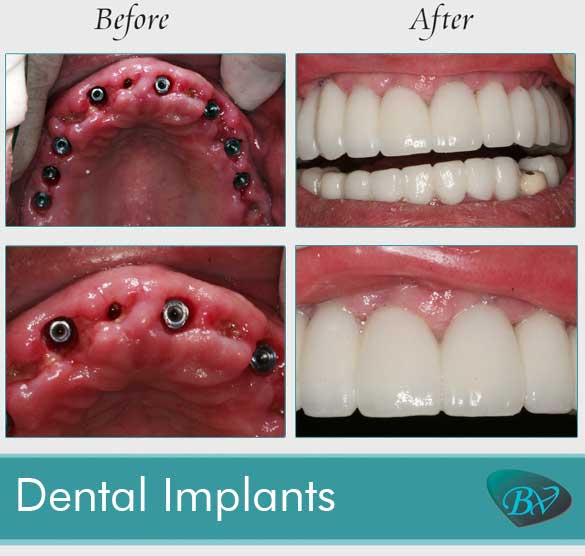Little Known Facts About Dental Sense.
Table of ContentsFascination About Dental SenseDental Sense for DummiesThe Ultimate Guide To Dental SenseThe Greatest Guide To Dental Sense
are medical gadgets surgically dental implanted right into the jaw to recover a person's ability to chew or their look. They provide support for synthetic (fake) teeth, such as crowns, bridges, or dentures. When a tooth is shed as a result of injury or condition, an individual can experience issues such as fast bone loss, malfunctioning speech, or adjustments to chewing patterns that result in pain.Oral implant systems include a dental implant body and oral implant abutment and might likewise consist of a joint fixation screw. Front tooth filling. The oral implant body is surgically put in the jawbone in place of the tooth's root. The dental implant joint is usually connected to the implant body by the joint fixation screw and extends through gums into the mouth to sustain the attached fabricated teeth
(https://www.edocr.com/v/djpmklwo/matthewmusic33101/dental-sense)Framework of The Oral Implant System choosing oral implants, speak to your dental supplier regarding the possible benefits and dangers, and whether you are a prospect for the treatment. Things to think about: Your overall health is a crucial consider figuring out whether you are a great candidate for dental implants, the length of time it will certainly require to recover, and the length of time the implant might remain in location.
Smoking might influence the healing process and decrease the long-lasting success of the implant. The recovery procedure for the implant body might take a number of months or longer, throughout which time you usually have a short-lived abutment instead of the tooth. the oral implant procedure: Very carefully adhere to the dental hygiene directions offered to you by your dental company.
8 Easy Facts About Dental Sense Shown
Implant failure can cause the demand for an additional procedure to repair or change the dental implant system. Recovers the ability to chew Brings back cosmetic appearance Assists maintain the jawbone from reducing due to bone loss Maintains the health of the bordering bone and gums Aids keep nearby (close-by) teeth stable Improves quality of life Damage to surrounding all-natural teeth throughout dental implant placement Injury to the surrounding cells throughout surgical treatment, such as sinus opening Injury during surgical procedure (for instance, fracture of bordering jawbone) Inadequate function, such as seeming like the teeth do not attack with each other normally A feeling that the tooth hangs or twisting in location resulting from an abutment screw loosening Implant body failing (looseness of the implant body) as a result of systemic infection, which may be extra likely in people with unchecked diabetes mellitus due to neighborhood infection in bone and gums supporting the implant body as a result of delayed healing, which may be most likely in clients who smoke Trouble cleaning the gums around the dental implant, resulting in poor oral health Unattended gum condition Post-surgical numbness as a result of nerve impingement or damages Always alert healthcare providers and imaging specialists that you have dental implants prior to any kind of magnetic vibration imaging (MRI) or x-ray treatments.
FDA is not knowledgeable about any negative events reported for MRI or x-ray treatments with dental implants. Dental implants systems are usually made from products that adhere to international consensus requirements of the International Company for Standardization (ISO) or ASTM International. These criteria have details of what makes a secure material.

A dental implant is a structure that replaces a missing tooth. With screw-like tools, the doctor inserts an implant right into the jawbone, and it acts as an anchor for a synthetic tooth, called a crown.
The 7-Second Trick For Dental Sense
Some people are not qualified for oral implant surgical treatment. It is for oral cosmetic surgeons to run on individuals with: severe illnessuncontrollable metabolic diseasebone or soft tissue condition or infectionIf these issues are fixed, an individual can have the surgery. In, oral doctors avoid operating on people with: If people with any one of the above go through dental implant surgical procedure, there is a higher her comment is here risk of the dental implant failing.

Dental dental implant surgical procedure is a customized procedure. Give you time to heal. Connect the article and final crown, bridge or denture.
Next off, your specialist will meticulously position the oral implant into your jaw. Ultimately, your specialist will certainly reposition your gums and shut the incision with stitches. If your implant is near the front of your mouth, your dentist will certainly make a momentary tooth for you to put on up until you heal. That way, you will not have a void in your smile while you recoup.
Excitement About Dental Sense
During the recovery phase, your jawbone needs to fuse to the dental implant. This process can take anywhere from 3 to 9 months.
When your dental implant heals, your dental expert can attach the abutment (tiny connector message) and your final reconstruction (crown, bridge or denture). This usually takes regarding one hour to complete and may call for a second small surgery. You shouldn't really feel any type of discomfort during your dental implant treatment since your service provider will use medicine to numb your gums.